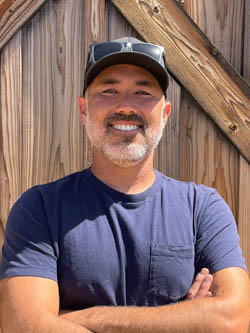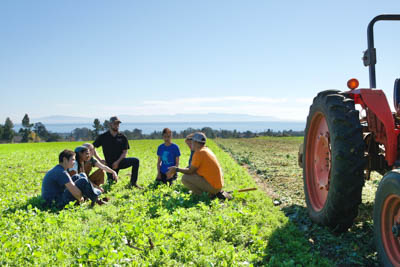This year UC Santa Cruz celebrates 55 years of national leadership in organic and sustainable agriculture, and the campus hub for those efforts, the Center for Agroecology, is gearing up to expand its impact even further. The center recently selected Executive Director Darryl Wong to provide administrative and strategic leadership in support of the center’s mission to advance agroecology and build an equitable future for food systems. His work will complement Faculty Director Stacy Philpott’s continued oversight of the center’s academic and research functions.
Wong has been the Research Lands manager at the Center for Agroecology since 2013, which has allowed him to work across the center's food production, education, and research programs. He’s an alumnus of the center’s apprenticeship program and is completing a Ph.D. in Environmental Studies at UC Santa Cruz, with a focus on soil health and organic no-till agriculture. He owned a diversified organic farm before joining the Center for Agroecology and has more than 15 years of farming experience.
As Wong steps into his new role, the Center for Agroecology is poised to help shape the future of global food systems, amidst new challenges and opportunities emerging from rapid social, environmental, and technological change. The center will also continue to draw upon its history as perhaps the oldest university-based organic farm in the country. And the team remains committed to core services, including food access for students and the community, experiential education through the UCSC agroecology major and apprenticeship program, extension services for farmers, and cutting-edge research on sustainable agriculture.
The UC Santa Cruz news team connected with Wong to learn more about the center’s goals for the future and the perspective he’ll bring as executive director. Below are highlights from that interview.
UCSC: Congratulations on your new position, Darryl. How are you feeling about stepping into the executive director role at the Center for Agroecology?
Wong: I’m really excited! I sometimes joke that I’ve experienced the center from just about every angle that you can, and one of the things that feels so exciting to me is to be able to share with others how impactful the Center for Agroecology and the UC Santa Cruz Farm and Alan Chadwick Garden can be, as someone who has had a really deep and grounded experience with it myself. I’m really looking forward to the challenge of thinking about how all of the center’s programs and resources can fit together to maximize our impact on food systems.
UCSC: As the former research lands manager for the center, how do you see the legacy of organic farming on campus reflected in the types of research taking place here today?
Wong: The Center for Agroecology is really unique in that we have a long history of food production that has had research layered on top of it. The fact that we maintain a functioning organic farm and garden right here on campus allows for a next level of research that combines aspects of technical, natural, and biophysical sciences to understand these lands as whole systems. That’s different from the approach you’ll see in agricultural sciences, which is often focused on constituent parts. Our research lands are more like a petri dish that allows folks to study the relationships at work in agricultural systems. And that includes the relationships between people and the land. The center’s work couples highly technical agricultural research with a broader focus on the social issues that go hand-in-hand with that.
UCSC: Could you talk a little bit more about the social aspects of agroecology and how this informs the center’s work?
Wong: Well, when people talk about sustainable agriculture, they're usually thinking about organic production methods, or strategies like no-till farming or cover-cropping or nitrogen cycling. And there’s certainly a lot left to learn and discover about sustainable production methods. But also, with some of these things, we are now beyond the point of needing to prove that they work: we know that they can. Now we need to figure out which levers to lean on to push forward social change in transforming food systems to more sustainable forms of production and distribution and more equitable access and labor practices. Because, ultimately, there are social issues in agriculture that dictate the biophysical realities on the ground.
For example, growers are often limited in what they can do by societal decisions about how we value food and land. That’s reflected in how much consumers are willing to pay, what regulations exist around things like pesticides, how the market rewards consolidation, and how commodity supports for conventional produce bring prices down for all food. As a farmer, I ran up against some of those stark political economic realities myself. And that’s part of what drew me to the Center for Agroecology. UC Santa Cruz has long been a leader in the interdisciplinary study of food systems, and the center’s work pairs cutting-edge organic farming practices with insights on societal forces in agriculture in a way that is really unique and powerful.
UCSC: And how does the educational mission of the center contribute to food systems change?
Wong: If you look back at the history, in the early days, the farm here at UC Santa Cruz was one of the only games around that gathered folks who were clued in to organic farming and agroecology principles. And part of the role that our campus played was offering practical training and curriculum, but there was also a community-building aspect that has been really important. The people who came to study agroecology at UC Santa Cruz were early adopters who made connections with each other that they kept with them as they moved on in their careers. And today, when you look across the country at the graduates of our apprenticeship program, our former students, and our early faculty members, you can really see how there’s a web of support helping to grow this movement that leads right back to UC Santa Cruz.
Moving forward, I think our goal is really to train the next generation of scientists and activists who can speak across the food system with both broad social understanding and real-world experience. I’m not expecting that everybody who comes through the agroecology major or the apprenticeship program wants to start a farm and drive a tractor. They could end up being someone who’s doing state policy work in Sacramento who's fired up about accessibility in agriculture and knows how much work it takes to harvest a strawberry. When someone talks to them about the issues facing strawberry workers in the field, they will have experiential knowledge in their fingertips and in their backs of how hard that work is and what people are asked to do to produce that crop.
UCSC: What other essential issues will the center tackle to advance its mission into the future?
Wong: We’re thinking a lot about who can access the center and the educational opportunities that are here and how we can provide the right formats and support to connect this resource that has been so impactful in the food system with traditionally underserved populations that haven’t had access to it before. This is especially important in a time when there are so many new tools emerging in agriculture through the development of AgTech. When you give someone a tool, what they do with it is going to depend very much on the perspective they’re coming from, so we really need to be putting new technologies into the hands of people like farm workers and their families, who have deep lived experience with agriculture, to see where they will take it.
I think there’s potential for UC Santa Cruz to play a role in making those connections happen. We need to understand the implications of emerging technologies and access to technology and who gets to be at the table when it's being developed. Someone needs to ensure that those questions are being asked. And I think, as a campus, we’re uniquely well-positioned to help do that, given the strengths of both our engineering and social sciences programs. I think there’s a real opportunity to ensure that emerging agricultural technology doesn’t steamroll people, as it sometimes has in the past, and that AgTech can instead be an example of tech for social good. I’m excited to see what role the Center for Agroecology can play in that process.




